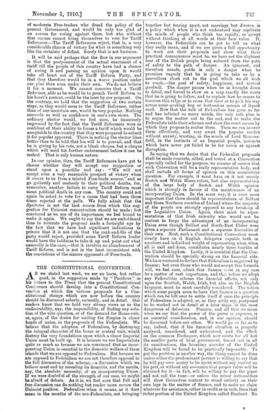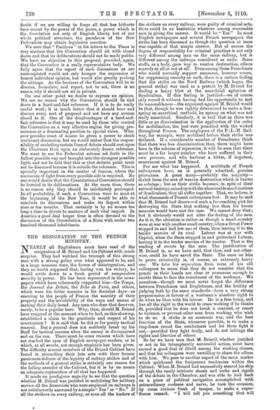THE CONSTITUTIONAL CONVENTION.
AS we stated last week, we see no harm, but rather good, in the suggestion made by " Pacificus " in his letters to the Times that the present Constitutional Conference should develop into a Constitutional Con- vention at which the various proposals for a Con- stitutional change which are now before the country should be discussed soberly, earnestly, and in detail. Our readers know that we hold very strong views as to the undesirability, nay, the impossibility, of finding any solu- tion of the veto question, or of the demand for Home-rule, or, again, of the desire for uniting the Empire in closer bonds of union, in the proposals of the Federalists. We believe that the adoption of Federalism, by destroying the integral character of the home or central unit, would. destroy the very foundations upon which a closer Imperial Union must be built up. It is because we are Imperialists quite as much as because we are convinced that an incor- porating Union is essential to the domestic welfare of these islands that we are opposed to Federalism. But because we are opposed to Federalism we are not therefore opposed to the full discussion of the scheme,—a discussion which we believe must end by revealing its demerits, and the merits, nay, the absolute necessity, of an incorporating Union. If we were doubtful of the strength of our case, we might be afraid of debate. As it is, we feel sure that full and free discussion can do nothing but render more secure the Unionist position. Federalism when it means, as it does mean in the mouths of .the neo-Federalists, not bringing together but tearing apart, not marriage but divorce, is a policy which when it is not understood may captivate the minds of people who think too rapidly, or accept without thinking at all words at their face value. If, however, the Federalists can be got to tell us what they really mean, and if we are given a full opportunity to work out their proposals and show what their practical consequences must be, we have not the slightest fear of the British people being seduced from the path of safety to the path of danger. An ignorant, and therefore unsafe, guide is only a danger when he promises vaguely that he is going to take us by a marvellous short cut to the goal which we all wish to reach,—the goal of safety, happiness, and mutual goodwill. The danger passes when he is brought down to detail, and forced to show on a map exactly the route that he is going to follow, and to explain how he means to traverse this ridge or to cross that river or to pick his way across some quaking bog or bottomless morass of liquid. mud. Now that the talk of Federalism has gone so far and has infected so many minds, the only safe plan is to argue the matter out to the end, and to make the Federalists table their schemes and show the exact means by which they propose to realise them. Then we can answer them effectively, and may await the popular verdict without anxiety, trusting, in the words of Lord Beacons- field, in the instincts of an Imperial people, instincts which have never yet failed to be for union as against disruption.
In saying that we desire that the Federalist proposals shall be made concrete, sifted, and tested at a Convention especially called for the purpose, we assume of course that such Convention will be a really representative body, and shall include all forms of opinion on this momentous question. For example, it must have on it not merely Scotch an Welsh Home-rulers, but also representatives of the large body of Scotch and Welsh opinion which is strongly in favour of the maintenance of an incorporating Union. In the same way, it is even more important that there should be representatives of Belfast and those Northern counties of Ireland where the majority of the people are strongly opposed to any break-up of the Legislative Union. Again, there must be repre- sentatives of that Irish minority who would not be content to forgo the advantages of an incorporating Union even though Belfast and North-East Ulster were given a separate Parliament and a separate Executive of their own. Next, such a Constitutional Convention must clearly have on it English delegates capable both in numbers and individual weight of representing what, when all is said. and done, constitutes nearly three-fourths of the -United Kingdom. Lastly, it is essential that the Con- vention should be specially strong on the financial side. We have ventured to declare that Federalism is negatived by finance ; but even those who would not accept this formula will, we feel sure, admit that finance must in any case be a matter of vast importance, and that before we adopt any Federalistic scheme the financial effects, not only upon the Scottish, Welsh, Irish, but also on the English taxpayer, must be most carefully considered. The notion which some people seem to have that finance is a question which can be left over to settle itself if once the principle of Federalism is adopted, or, as they airily say, postponed to be worked out in detail at a later stage, is the most dangerous of delusions. Finance, and all that we moan when we say that the power of the purse is supreme, is an essential consideration, and, in our opinion, should be discussed. before any other. We would go so far as to say, indeed, that if the financial situation is properly analysed, considered, and understood, and the effect on the common Exchequer, which now exists for all but the smaller parts of local government, traeed out in all its ramifications, the breaking asunder of the United Kingdom will be found to be practically impossible. To put the problem in another way, the thing cannot be done unless either the predominant partner is willing to say that he will pay over money to be spent without any control on his part, or without any assurance that proper value will be obtained for it—in fact, will be willing to pay the piper and not call the tune—or unless the minor nationalities will show themselves content to stand entirely on their own legs in the matter of finance, and to make no claim whatever for assistance, either in credit or in cash, from that richer portion of the United Kingdom called England. No doubt if we are willing to forgo all that has hitherto been meant by the power of the purse, a power which is the foundation not only of English liberty but of our whole political structure, the paradoxes of the New Federalism may obtain legislative sanction.
We note that " Pa,cificus " in his letters to the Times is very anxious that the Convention should sit with closed doors and that its deliberations should not be made public. We have no objection to this proposal, provided, again, that the Convention is a really representative body. We fully agree that the report of such discussions as are contemplated would not only hamper the expression of honest individual opinion, but would also greatly prolong the sittings. As the business of the Convention will be to discuss, formulate, and report, not to act, there is no reason why it should not sit in private.
On one other point we desire to express an opinion. We see no reason why the Convention should be tied down to a hard-and-fast reference. If it is to do really useful work, it is much better that it should hear and discuss every sort of proposal and not have any avenue closed to it. One of the disadvantages of a hard-and- fast reference is that it may be used by those who control the Convention as a very effective engine for giving pro- minence or a dominating position to special views. Who- ever presides must of course be given a power to check irrelevant discussion, but we would rather that the respon- sibility of excluding certain lines of debate should rest upon the Chairman than upon an elaborately drawn reference. We want to see the Federalist scheme set forth in the fullest possible way and brought into the strongest possible light, and not be told that this or that definite point must not be discussed because it is outside the reference. This is specially important in the matter of finance, where the maximum of light from every possible side is required. No one would desire that the Constitutional Convention should be hurried in its deliberations. At the same time, there is no reason why they should be indefinitely prolonged. In all probability, if such a Convention were to meet at the beginning of the New Year, it would be able to conclude its discussions and make its Report within nine or ten months. That certainly is by no means too long a time to devote to matters of such vital import. In America a good deal longer time is often devoted to the discussion of the Constitution of a. State with under two hundred thousand inhabitants.



































































 Previous page
Previous page